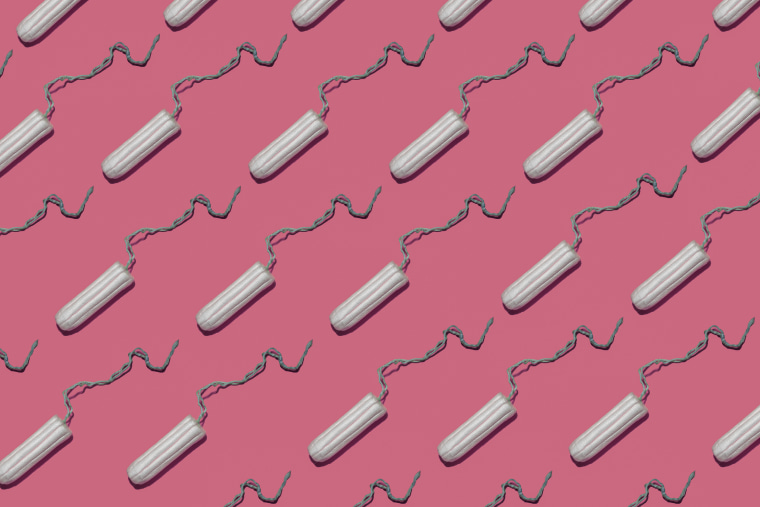We believe it's wrong for states to profit off our menstrual periods. Tampons and pads are essential to millions, yet 34 states and many countries still impose sales taxes on them even as they exempt other necessities — like groceries and prescription medications — from those very same taxes.
The so-called tampon tax has been hated, debated and eliminated around the globe, from Australia to Canada, from India to Kenya. It found its way last month into negotiations over the U.K.’s efforts to leave the European Union. Democratic presidential candidates including Sen. Kamala Harris of California, Andrew Yang, Julián Castro and Sen. Cory Booker of New Jersey recently tweeted their disdain for the tampon tax, following the lead of President Barack Obama, the first sitting president to opine on the economics of menstruation, back in 2016.
Here in the United States, a 2015 petition catalyzed a nationwide movement to scrap the tax. But passing these laws remains an uphill climb. Over the past four years, 32 states took up the issue, but only six actually implemented it.
Connecticut, Florida, Illinois and New York all passed legislation, Nevada took the vote directly to the people via a statewide ballot in 2018, and Rhode Island passed an exemption for menstrual products as part of the state budget effective Oct. 1. As of Jan. 1, 2020, California will start exempting menstrual products, too — but only temporarily, as it has been written into the state’s two-year budget. And still other U.S. jurisdictions that have eliminated the tax are Chicago, Denver and Washington, D.C. Another 10 states don’t tax menstrual products either because they collect no sales tax at all or include menstrual products under a broad umbrella of exemptions.
In 2019 alone, tampon tax bills were introduced in 22 states. Ohio is the latest state where a win is possible. A bill exempting menstrual products from sales taxes recently passed the state House and Senate, and now heads to Gov. Mike DeWine’s desk. His signature would cement bipartisan support for an issue that already enjoys significant levels of interest and engagement from left and right alike; in the four states that passed similar legislation, the governors who signed those laws are equally split between Democrats and Republicans.

As one of the Ohio lawmakers who sponsored the bill and as an attorney who has partnered with politicians on both sides of the aisle in statehouses and in Congress to address menstruation, we both know very well why this issue resonates. It lifts a small financial burden. It helps us inch toward a model of economic and gender equity. And it is a gateway to get people to talk and think about the wider implications of menstruation — social, health, economic and otherwise.
The road to victory in Ohio has not been easy. Its tampon tax exemption has been years in the making. After passing the House in three previous legislative sessions, the Senate failed to act each time, causing those bills to die. A House bill finally went to a vote in the Senate last month and won near unanimous support.
Ohio also faces the threat of legal liability. A lawsuit filed by a local attorney, Sandra Kelly, is currently pending before a state appeals court; it alleges that the tax violates both the Ohio and U.S. Constitutions because tampons are classified by the federal government as medical devices, which are normally exempt from sales tax under Ohio law, but are products required only by one sex. That claim was based on a highly publicized class action suit in New York, which successfully pressured state leaders to take action. The good news for Ohio is that it can spare itself the legal fight: Just sign the bipartisan bill into law.
Across the country, lawyers are gearing up in states that still impose sales taxes on menstrual products. A new project, Tax Free. Period., is mobilizing major law firms, local counsel, leading academics and nonprofit experts to craft legal challenges to these taxes. Governors, attorneys general, legislators and tax commissioners will be faced with a choice: Either defend in court state laws and regulations that impose a punitive and discriminatory tax, or join our movement to change these archaic, unconstitutional laws.
Among the voices being raised is constitutional law scholar and dean of University of California Berkeley Law School Erwin Chemerinsky, who argued in a Los Angeles Times op-ed this summer that the tampon tax amounts to sex-based discrimination in violation of equal protection, at both the state and federal level. In other words, a sales tax on menstrual products is not just inequitable and unfair; it is unconstitutional and illegal.
By law, by budget or by court order, the tampon tax needs to go — in Ohio and every state. And if legislatures and governors fail to act, a team of lawyers stands ready to demand that the courts do so.

